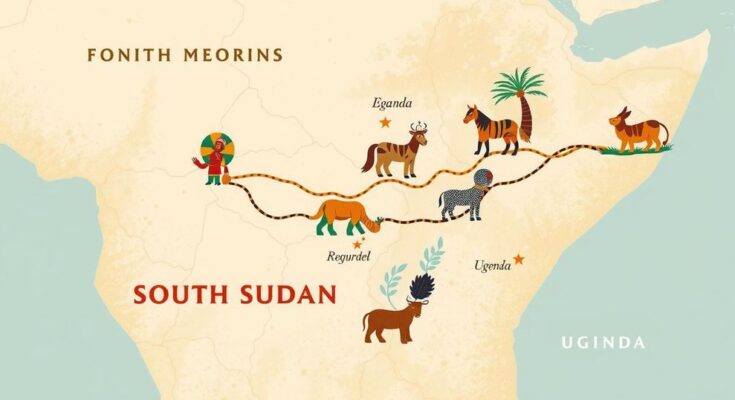South Sudan faces critical challenges in its relationship with Uganda, characterized by historical ties and political complexities. Uganda’s military support during conflicts raises concerns over influence and bias, exacerbating internal divisions within South Sudan. The need for a balanced foreign policy, diversifying partnerships, and strengthening governance is essential for protecting sovereignty and regional stability.
South Sudan, the world’s youngest nation, is currently at a pivotal juncture, navigating its complex bilateral relations with Uganda. Their historical ties exhibit both shared cultural connections and divergent political interests, which can significantly impact regional stability and economic development.
During South Sudan’s protracted quest for independence, culminating on July 9, 2011, Uganda played a crucial role by providing military and logistical support, particularly during conflicts involving the Lord’s Resistance Army (LRA). However, this assistance raised questions about Uganda’s ulterior motives in the region.
Post-independence, the interactions between South Sudan and Uganda have been marked by cooperation and competition. South Sudan has become an essential market for Ugandan products, while Uganda has been instrumental in peace processes through regional organizations like the Intergovernmental Authority on Development (IGAD), facilitating trade and goods flow into landlocked South Sudan.
Nevertheless, relations have been contentious, especially following South Sudan’s civil war in December 2013, when Uganda deployed its military to back President Salva Kiir’s government, complicating the local political landscape. This military intervention has caused significant tensions between the two nations as well as within South Sudan, leading to numerous casualties and humanitarian crises.
The 2018 peace agreement ended formal conflict, yet South Sudan remains fragmented, facing governance challenges and a worsening humanitarian situation. Relations with Uganda have evolved beyond mere friendship; they now reflect a complex regional power dynamic, influenced by interventions in neighboring states like the Democratic Republic of Congo (DRC) and Somalia, often violating humanitarian laws.
Uganda’s support for Kiir’s administration has stirred accusations of bias among opposition groups, exacerbating political divisions within South Sudan and entangling the nation in a broader regional power struggle involving nations like Sudan and Ethiopia.
Economically, the two nations compete for influence, particularly over trade and energy resources. Uganda’s infrastructure advancements, such as oil pipelines, could facilitate South Sudan’s oil exports. However, such competition may inflame existing tensions as they strive for resource control.
International scrutiny surrounds Uganda’s investments in South Sudan’s oil sector, offering strategic advantages despite ongoing instability. Both nations must find common ground to prevent disputes that could derail shared interests.
Positioned strategically in the Horn of Africa, South Sudan engages with various neighboring countries and global powers including the U.S., China, and Russia, all interested in the rich natural resources of the region. Uganda seeks stability in South Sudan to safeguard its borders and maintain its regional influence, but its strong ties to Kiir’s government have drawn ire from countries such as Sudan.
With international organizations like the UN and the African Union impacting bilateral strategies, Uganda has been urged to pursue a more neutral and reconciling role in South Sudan, fostering dialogue among competing factions.
To effectively manage its relationship with Uganda, South Sudan requires a well-defined diplomatic strategy that supports its sovereignty while balancing military and economic dependencies. It is essential to avoid overrelying on Uganda, as doing so may entangle South Sudan in regional disputes.
Ongoing engagement with Uganda, coupled with diversified partnerships with nations like Ethiopia and Kenya, will help create a balanced foreign policy. Simultaneously, addressing governance challenges is vital to minimize foreign meddling in domestic affairs and stabilizing the nation.
Therefore, achieving inclusive governance and authentic peacebuilding remains the cornerstone for South Sudan to reassert its sovereignty and transcend external influences in regional politics.
In summary, South Sudan must navigate a complex relationship with Uganda marked by historical ties and intervening interests. While cooperation in trade and peace processes has occurred, military involvement and political favoritism pose significant challenges. Strategic diversification of partnerships, with a focus on improving governance, is crucial for South Sudan to safeguard its sovereignty and foster stability in the region. Only through commitment to inclusive governance can South Sudan effectively assert its independence on the geopolitical stage.
Original Source: www.radiotamazuj.org




